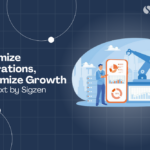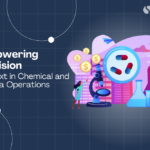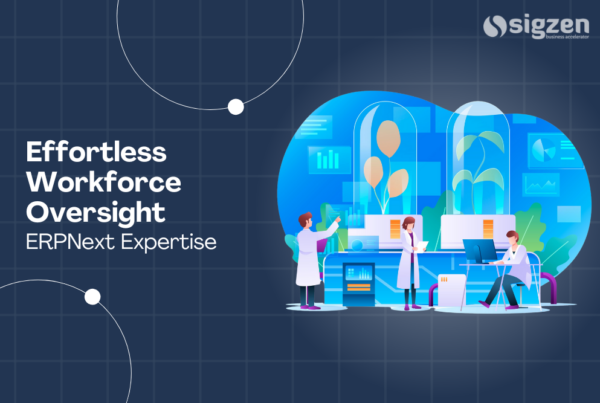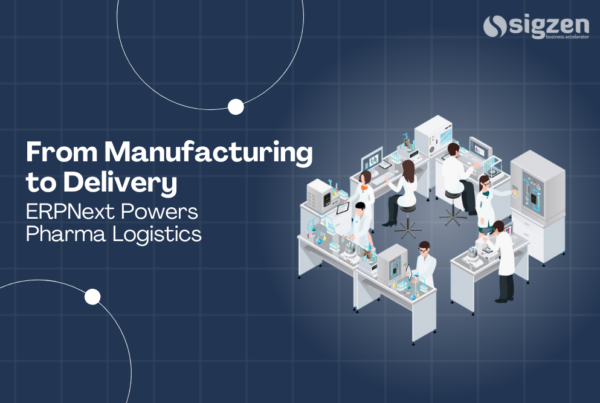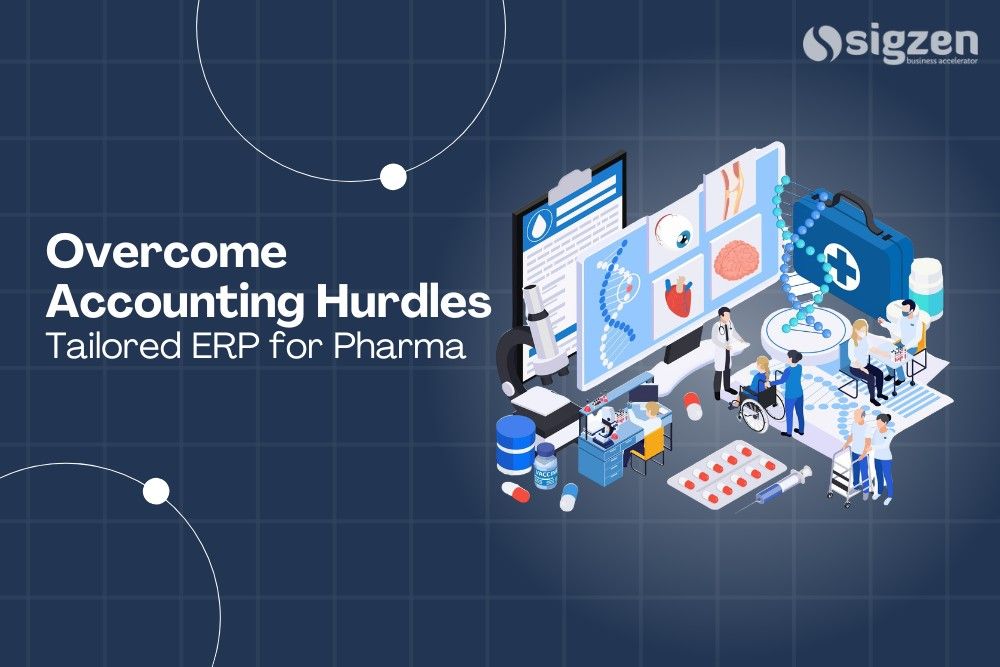
The pharmaceutical industry operates in one of the most regulated and complex environments. From stringent compliance requirements to managing fluctuating costs of production and inventory, financial management in this sector is not just about balancing numbers—it’s about ensuring sustainability and growth. This is where ERP for Pharmaceutical businesses comes into play, particularly in addressing Accounting and Finance for Pharmaceutical challenges.
By leveraging ERP systems like those offered by Sigzen, companies can streamline their accounting and financial operations, ensuring efficiency, accuracy, and regulatory compliance.
Why Accounting and Finance are Critical in the Pharmaceutical Industry
The pharmaceutical industry faces unique financial challenges:
- Compliance with Regulatory Standards: Adherence to stringent laws like GMP (Good Manufacturing Practices) and FDA regulations.
- Complex Supply Chain Costs: Managing costs associated with R&D, raw materials, production, and distribution.
- Inventory Management: Balancing inventory levels to avoid stockouts or overstocking, especially for perishable raw materials.
- Global Operations: Handling multi-currency transactions, taxation, and financial reporting across regions.
Without a robust system, managing these aspects manually can lead to errors, inefficiencies, and missed opportunities.
How ERP Solves Accounting and Financial Challenges in Pharmaceuticals
ERP systems like ERPNext provide integrated solutions that consolidate data, automate processes, and offer real-time visibility into financial operations.
1. Streamlined Financial Processes
ERP systems automate repetitive tasks like invoicing, payroll, and tax calculations. The Accounting Module in ERPNext enables:
- Real-time tracking of income and expenses.
- Automatic generation of financial statements.
- Seamless integration with bank accounts for reconciliations.
Impact: This reduces manual errors and accelerates financial reporting.
2. Regulatory Compliance and Audit Readiness
Pharmaceutical companies must adhere to regulations set by bodies like the FDA, WHO, and ISO. ERP systems ensure compliance by:
- Automating documentation and report generation.
- Tracking every transaction for audit readiness.
- Maintaining accurate records for tax filing.
With SigzenChem ERP, companies can ensure compliance without dedicating excessive time and resources.
3. Cost Management and Budgeting
Fluctuating raw material prices and high R&D costs can strain financial resources. ERP systems help by:
- Providing real-time cost analysis.
- Automating budget allocation across departments.
- Enabling better forecasting for R&D and production costs.
The Purchase Cycle Module ensures optimized procurement strategies, reducing unnecessary expenses.
4. Inventory and Asset Management
Pharmaceutical companies deal with large inventories of raw materials and finished goods, many of which are perishable. ERP systems offer:
- Automated tracking of inventory levels.
- Alerts for expiry dates and low stock levels.
- Integration with Asset Management for equipment tracking.
Impact: Optimized inventory reduces wastage, improving financial outcomes.
5. Multi-Currency and Taxation Support
With global operations, pharmaceutical companies need to manage transactions in multiple currencies and comply with varying tax laws. ERP systems:
- Automate currency conversions.
- Handle GST, VAT, and other taxes seamlessly.
- Generate country-specific financial reports.
ERPNext’s accounting features support global taxation norms, making it an ideal solution for multinational pharmaceutical businesses.
6. Enhanced Decision-Making with Real-Time Data
Financial decisions are only as good as the data they are based on. ERP systems provide dashboards and analytics tools to:
- Track KPIs like profitability, cash flow, and revenue growth.
- Identify cost-saving opportunities.
- Optimize pricing strategies.
By centralizing data, ERP systems eliminate silos, ensuring that decision-makers have access to the information they need.
Real-Life Case Study: ERP for Pharmaceutical Finance
Scenario: A mid-sized pharmaceutical company faced challenges with manual financial processes, leading to delays in compliance reporting and errors in tax filings. After implementing SigzenChem ERP, the company achieved:
- 30% reduction in administrative overhead.
- 50% faster tax filing and compliance reporting.
- Real-time tracking of R&D costs, ensuring better budget allocation.
This translated into an overall cost savings of $200,000 annually, with enhanced regulatory compliance.
Key Features of ERP Accounting for Pharmaceuticals
- Automated Financial Reporting: Generate balance sheets, income statements, and cash flow reports effortlessly.
- Compliance Tools: In-built features for audit trails and regulatory reporting.
- Integrated Modules: Seamless integration of accounting with CRM, inventory, and manufacturing.
- Scalability: Support for growing operations and multi-location setups.
- User-Friendly Dashboards: Real-time insights into financial health.
Explore these features in detail with Sigzen’s ERP Solutions.
Choosing the Right ERP for Pharmaceutical Accounting and Finance
When selecting an ERP system, pharmaceutical companies should consider:
- Industry-Specific Features: Modules tailored for pharmaceutical operations, such as compliance tracking and inventory management.
- Scalability: The ability to support future growth and multi-region operations.
- Ease of Use: User-friendly interfaces that reduce training time.
- Vendor Expertise: Partnering with a vendor like Sigzen ensures access to industry-specific expertise and support.
Benefits of Sigzen ERP for Pharmaceutical Accounting
Sigzen’s ERP solutions offer a comprehensive approach to accounting and financial challenges, providing:
- Customizable modules for compliance, budgeting, and inventory.
- Real-time data for improved financial transparency.
- Support for global taxation and multi-currency transactions.
Visit Sigzen to request a demo and see how their ERP solutions can transform your pharmaceutical business.
Conclusion: Revolutionizing Pharmaceutical Finance with ERP
The pharmaceutical industry’s financial challenges are complex, but with the right ERP system, companies can overcome them efficiently. From streamlining accounting processes to ensuring compliance and optimizing costs, ERP systems deliver measurable value.
Implementing ERP for Pharmaceutical businesses is no longer a luxury—it’s a necessity for staying competitive in a rapidly evolving industry. Partner with Sigzen to unlock the full potential of ERP technology and achieve financial excellence.
